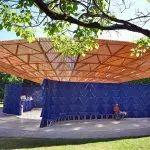How sustainability influences my work: Interview with alumnus Gilbert Shava
Posted on: 28 March, 2023
Career journey
MBA in Construction & Real Estate – 2014, MSc Real Estate – 2022
 Gilbert started his career as a volunteer draftsman in a small Municipality in Zimbabwe. Following this he joined the Cape Peninsula University of Technology where he studied Architectural Technology (Applied Design) to bachelor’s degree level. Not long after this he joined UCEM to study an MBA in Construction & Real Estate and more recently an MSc in Real Estate.
Gilbert started his career as a volunteer draftsman in a small Municipality in Zimbabwe. Following this he joined the Cape Peninsula University of Technology where he studied Architectural Technology (Applied Design) to bachelor’s degree level. Not long after this he joined UCEM to study an MBA in Construction & Real Estate and more recently an MSc in Real Estate.
He is a High Court of Namibia certified Mediator and an Arbitrator, as well as a certified Project Management Professional (PMP) with the Project Management Institute (PMI). Gilbert works predominantly as a Project Manager of construction and valuation projects.
What were your experiences of sustainability at UCEM?
Sustainability has always been in my core research thinking and interest since the time I did my bachelor’s degree in architecture. When I came to UCEM to study my masters, my dissertation looked at how a sustainable low-cost affordable house may be designed by architects in the global south to accommodate low-income earners. My favourite sustainability topics I studied at UCEM were affordable housing by use of recycled materials, brownfield developments and ESG in valuation. During these topics, so many of my tutors stood out for me in terms of their passion and advocacy for sustainability: Dr Graeme Whitehall; Natasha Collins; Dr Jan Wilcox; David Hourihan; and Diana Hardstaff.
UCEM promotes sustainability very well. For me, being able to access the course remotely is a perfect example of this. UCEM provides the opportunity for students to attend the live lectures and access resources from all over the world. The research that UCEM carries out on sustainability are very good and I enjoyed checking the ’News & Events’ on the UCEM website as there is a lot of resources on sustainability.
How do you incorporate sustainability into your role?
At work I spend a substantial amount of time sharing sustainable means and alternatives in construction. I consider innovative opportunities around affordable ways of providing low-cost housing building materials. I am currently involved in an experiment that involves making bricks out of mushrooms. This is very sustainable as it provides bricks for construction whilst providing food for communities.
My job plays a significant role in the local community and the environment. As a Project Manager for construction projects in an architectural firm we do feasibility assessments that involves communities where buildings will be constructed. We always look at sustainable ways of saving existing trees, treatment of water for re-use in irrigation and the use of solar power for water heating.
In your role or generally across the sector, what do you hope to work on or see implemented in relation to sustainability?
I aspire to one day do a PhD to research sustainable innovative building design/materials for low-income earners. I hope to work on this in the near future and hope to be involved in a system where sustainable, affordable houses for low-income earners will be constructed for the benefit of many people in the global south and the world at large. I wish to one day be a founder of either a design, a system or provider of information useful for achieving sustainable construction practices, with the aim of saving time and reducing waste.
What do you think UCEM needs to tackle next in relation to sustainability?
I know that UCEM is doing lots of great sustainability work already. I would like to see an increase in initiatives for students and alumni as these will trigger a healthy debate around sustainability and push the agenda further. A webinar on the efficiency of brownfield sites and the innovative design that may offer sustainable affordable housing for low-income earners would be an interesting addition to UCEM’s offering.
Additionally, I think it would be useful for the institution’s sustainability agenda to introduce a PhD and research opportunities as this might encourage a lot of current and future students to carry out in-depth research and convert theory into practice.
Tell us about someone or something that inspires you to be more sustainable:

Serpentine Pavilion in Hyde Park, London, by Francis Kéré
Francis Kéré, an architect in Burkina Faso, inspires me with his ‘out-of-the box’ choice of materials for buildings, and how he includes local communities in his projects. Elemental Architects in Chile also inspires me in the way they come up with designs for affordable housing. There is also an architect here in Namibia, called Nina Maritz, who inspires me with her choice of local available materials for the projects she designs and the way she incorporates innovation and sustainability in these building projects.
What is your favourite climate action that you do in your personal life?
I make sure that I consider the environment and alternatives I could take or use to reduce my impact! Sometimes this can be recycling or the type of products I buy for my home. During COVID I think a lot of us got used to doing videocalls when we couldn’t meet up with people and I have kept doing this on occasion both personally and professionally to reduce the need for long car journeys.





